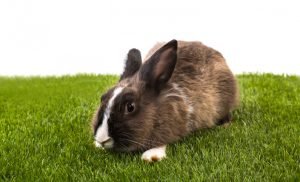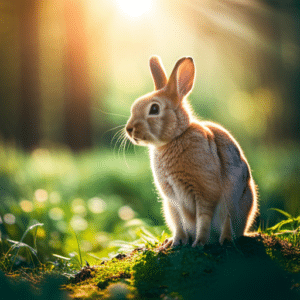As a responsible pet owner, you understand the importance of providing a balanced diet to your furry friend. But when it comes to rabbits, there’s more to their diet than just hay and pellets. In this blog post, we’ll explore the best fruit for rabbits, ensuring they enjoy not only a tasty treat but also a nutritionally sound addition to their diet.
Short Summary
Apples, berries, and pears are the top three recommended fruits for rabbits which should be given in moderation with proper preparation.
A balanced diet, consisting of hay & grass, leafy greens, and pellets, is essential for a rabbit’s health and well-being.
High-sugar fruits like bananas should be avoided as they may contain toxins that can harm rabbits. New fruit types should also be introduced gradually to monitor reactions.
Top Fruits for Rabbits: Healthy and Tasty Choices
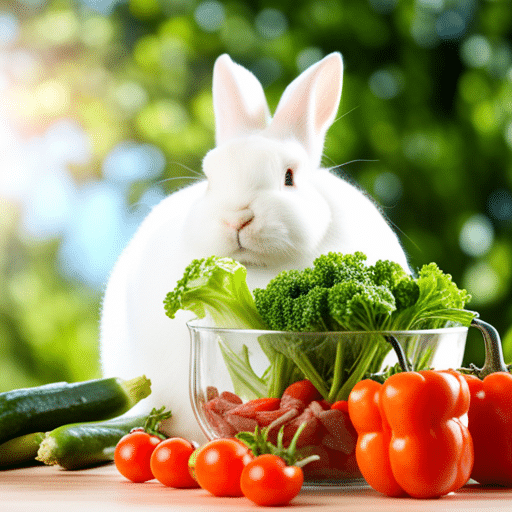
Rabbits are known for their sweet tooth, and incorporating fruits into their diet can provide them with essential nutrients while satisfying their cravings. But which fruits are safe for rabbits and which should be avoided?
Let’s dive into the top three fruits that are both healthy and delicious for your rabbit: apples, berries, and pears.
Apple
Apples are a fantastic source of dietary fiber, which is crucial for a rabbit’s digestive health. In addition, apples are packed with vitamins and minerals that complement the nutrients obtained from leafy green vegetables. However, it’s important to remember that apples should only be given as an occasional treat, ideally once or twice a week, and should be cut into small pieces with the seeds and stems removed. This is because apple seeds contain cyanide, which can be toxic to rabbits.
When introducing apples to your rabbit’s diet, it’s essential to start with just one type and gradually increase the amount over time. This approach allows you to monitor your rabbit’s reaction to the new treat and make any necessary adjustments to their diet.
Berries
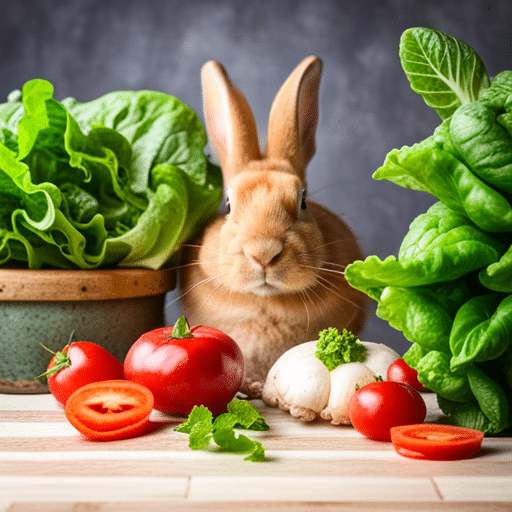
Berries, such as strawberries, blueberries, and raspberries, offer a nutritious and antioxidant-rich option for your rabbit. These fruits are packed with antioxidants that can help improve digestion and overall health. Just like with apples, it’s essential to limit your rabbit’s consumption of berries to avoid potential health issues such as gastrointestinal distress, dental problems, and excessive weight gain.
To ensure a healthy balance, provide your rabbit with no more than 1-2 tablespoons of high-fiber fresh fruit daily or every other day. Remember to also include a variety of leafy green vegetables in their diet for optimal nutrition.
Pears
Pears are a sweet and juicy fruit that can serve as a healthy treat for rabbits. They are rich in vitamins and minerals, such as vitamins C and K, fiber, and copper. However, it’s crucial to remember that pears should only be given in limited quantities as a treat, no more than 1-2 teaspoons per 2 pounds of body weight, 2-3 times a week.
Before feeding pears to your rabbit, remove the seeds and pits, as they can be hazardous for your furry friend. Proper preparation of the fruit ensures that your rabbit can safely enjoy this sweet treat without any concerns.
Serving Guidelines: Ensuring Proper Fruit Intake

When feeding fruits to your rabbit, it’s essential to follow proper serving guidelines, such as portion sizes, frequency, and preparation techniques. These recommendations help ensure that your rabbit enjoys the fruits safely and healthily without any adverse effects on their overall well-being.
Portion Sizes
It’s important to provide your rabbit with small portions of fruit, as the suggested serving sizes are based on their weight. For instance, adult rabbits should be given no more than two cups of fresh vegetables daily, while dwarf breeds and rabbits under five pounds should only receive one cup of fresh vegetables per day.
For fruits, the recommended serving is approximately 1 teaspoon per 2 pounds of body weight per day, either in a single feeding or distributed across multiple feedings. This ensures that your rabbit gets the right amount of nutrients without overindulging in sugary treats.
Frequency
To maintain a balanced diet for your rabbit, it’s important to limit their fruit intake to once or twice a week. This is because fruits have a high sugar content, which can cause digestive problems if consumed too often.
By offering fruits in moderation and focusing on providing a varied diet that includes hay, leafy greens, and pellets, you can ensure that your rabbit gets all the essential nutrients they need while still enjoying their favorite sweet treats.
Preparation Techniques
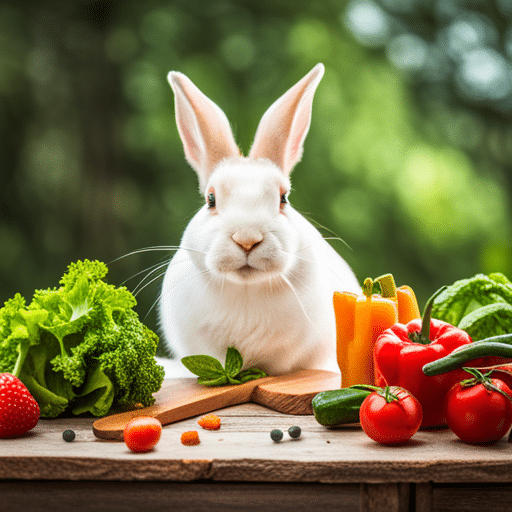
Before offering fruits to your rabbit, make sure to wash them thoroughly to remove any dirt or pesticides. Additionally, remove any seeds, stems, or pits from the fruit, as these can be harmful to your rabbit.
To make the fruit more manageable for your rabbit, cut it into small, bite-sized pieces. This makes it easier for your rabbit to eat and ensures that they can safely enjoy their treat without any choking hazards.
The Importance of a Balanced Rabbit Diet
A balanced diet is crucial for your rabbit’s health and well-being, and it’s essential to understand the key components that make up a proper diet. In this section, we’ll discuss the role of hay, leafy greens, and pellets in your rabbit’s nutrition and how they contribute to a balanced diet.
Hay is the most important part of a rabbit’s diet, providing essential fiber and alfalfa hay is a popular choice among rabbit owners.
Hay and Grass
Hay and grass are the most critical components of what rabbits eat. They provide the necessary fiber for digestion and help wear down their teeth. Any variety of grass hay, such as timothy, orchard grass, brome, or oat hay, is recommended for rabbits.
Offering fresh hay to your rabbit daily is essential for maintaining their digestive health and preventing gastrointestinal issues. Make sure to keep the hay clean and free of mold or dust for your rabbit’s safety.
Leafy Greens
Leafy greens are a significant part of a rabbit’s diet, offering essential nutrients and variety. It is recommended to provide approximately one handful (adult-sized) of leafy greens daily for your rabbit. This can be achieved by offering around 1 cup of greens for every 2 lbs of rabbit body weight once daily or distributed over multiple feedings per day.
Remember to choose a variety of leafy greens, including fresh greens and green leaf, for your rabbit, as this helps ensure they receive a range of nutrients. Rotate the types of greens you provide to keep their diet balanced and prevent the overconsumption of any single nutrient.
Rabbit Pellets
Rabbit pellets are a supplementary food source that should be given in small quantities, preferably made from timothy hay. The recommended amount of rabbit pellets is no larger than one to two tablespoons per day, depending on the rabbit’s size and age.
For rabbits under one year of age, alfalfa pellets can be provided, along with grass hay to balance the diet. As your rabbit grows, transition them to timothy-based pellets and continue to provide fresh hay and leafy greens for a well-rounded diet.
Fruits to Avoid: Potential Dangers for Rabbits
While fruits can be a great addition to your rabbit’s diet, some may pose risks to their health. In this section, we’ll explore the dangers of fruit seeds and high-sugar fruits to help you make informed decisions about the treats you offer your rabbit.
Fruit seeds can be dangerous to rabbits because they contain cyanide, which can be toxic to rabbits.
Fruit Seeds and Pits
Fruit seeds and pits can be toxic to rabbits due to trace amounts of cyanide. It’s crucial to remove seeds and pits from fruits like apples, pears, peaches, plums, and cherries before offering them to your rabbit. Taking the time to properly prepare fruits for your rabbit not only ensures their safety but also allows them to enjoy a tasty treat without the risk of ingesting harmful substances.
Always double-check the fruits you provide to your rabbit to make sure they are safe and free of seeds or pits.
High-Sugar Fruits
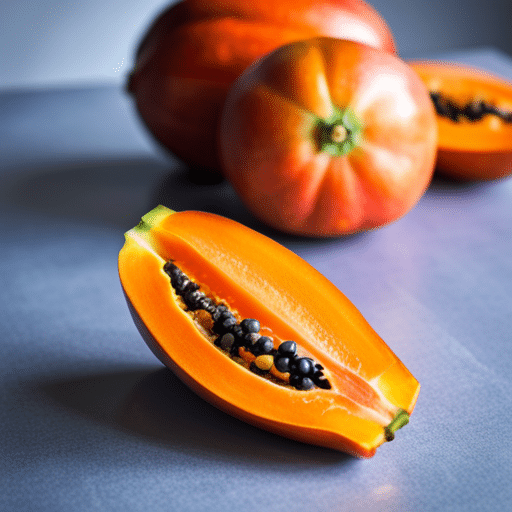
High-sugar fruits, such as bananas, grapes, mangoes, and pineapples, can cause digestive issues and obesity in rabbits if consumed in large quantities. To avoid these health problems, limit your rabbit’s intake of high-sugar fruits and opt for lower-sugar fruits like apples, berries, and pears instead.
By providing your rabbit with a balanced diet that includes a variety of low-sugar fruits, you can ensure they enjoy the nutritional benefits and sweet flavors of fruit without risking their health.
Tips for Introducing New Fruits to Your Rabbit’s Diet
When it comes to introducing fresh foods, like new fruits, to your rabbit’s diet, there are some essential tips to keep in mind to ensure a smooth and safe transition.
In this section, we’ll discuss the importance of introducing fresh fruits and vegetables, such as iceberg lettuce, focusing on fruits one at a time and gradually increasing the amount.
One Fruit at a Time
When introducing a new fruit to your rabbit’s diet, it’s a good idea to offer just one type of fruit at first. This allows you to monitor your rabbit’s reaction to the new treat and make any necessary adjustments to their diet. Be sure to observe their droppings for any changes in consistency or frequency, as this can be an indication of how well they’re tolerating the new fruit.
If your rabbit’s stool becomes soft or watery after consuming a new fruit, cease providing it and consult with your veterinarian for further guidance. Once your rabbit has adjusted to the new fruit, you can gradually introduce additional types, following the same cautious approach.
Gradual Introduction
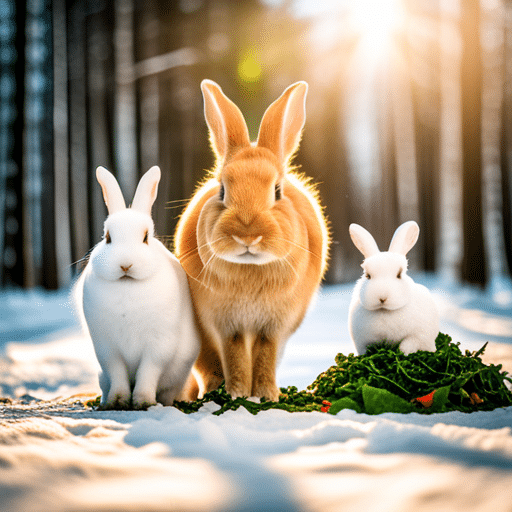
Start with small amounts of new fruits and gradually increase the quantity over time to avoid digestive issues and ensure your rabbit enjoys the new addition to their diet. For example, you might begin with a tiny piece of fruit and slowly increase the amount over several weeks.
Monitoring your rabbit’s fecal output during this process is crucial, as it can indicate whether they’re tolerating the new fruit well or experiencing any digestive issues. If you notice any changes in your rabbit’s stool consistency or frequency, cease providing the new fruit and consult your veterinarian for guidance.
Summary
In conclusion, providing a balanced diet for your rabbit is essential for maintaining their overall health and well-being. By incorporating a variety of fruits, such as apples, berries, and pears, along with hay, leafy greens, and pellets, you can ensure that your rabbit receives all the necessary nutrients they need. Always remember to follow proper serving guidelines and be mindful of potential dangers, such as fruit seeds and high-sugar fruits. With these tips in mind, you can confidently offer your rabbit a diverse and nutritious diet that caters to their sweet tooth while promoting optimal health.
Frequently Asked Questions
What fruit is best for rabbits?
Fruit, such as strawberries, bananas, raspberries, pineapple pieces, apples without seeds, and melons, can be given to a rabbit once or twice per week for a healthy treat.
Can rabbits eat fruit every day?
Fruit should only be given to your bunny occasionally as a treat, limited to one to two tablespoons per five pounds of body weight a few times a week. Bananas and grapes, high in sugar, should be limited to small amounts a few times a month.
Can rabbits eat apples?
Yes, rabbits can eat apples as a healthy treat, but make sure to remove the seeds and stems as they can be toxic.
What types of hay are suitable for rabbits?
Timothy, orchard grass, brome, and oat hay are all good choices for feeding your rabbit.
What is the recommended serving size for fruits in a rabbit’s diet?
A rabbit’s daily recommended fruit serving size is 1 teaspoon per 2 pounds of body weight, which can be given in one or multiple feedings.
This amount can be divided into multiple feedings throughout the day, or given all at once.

